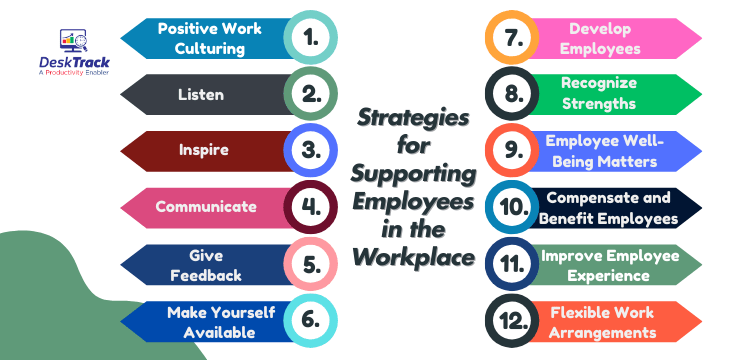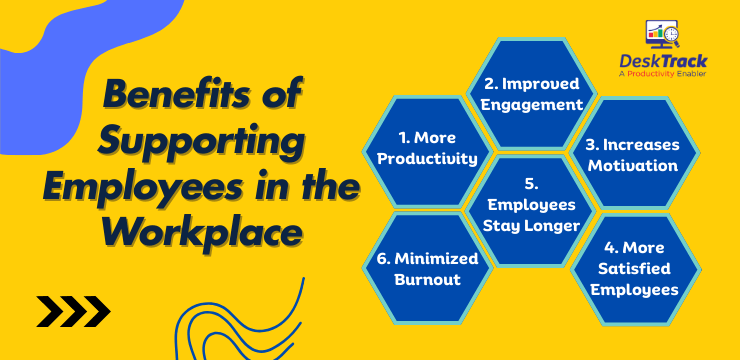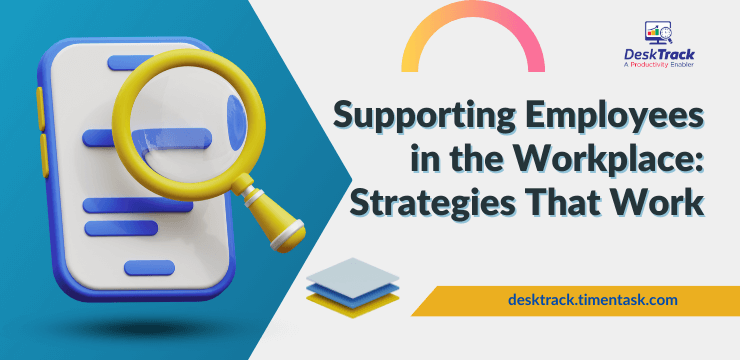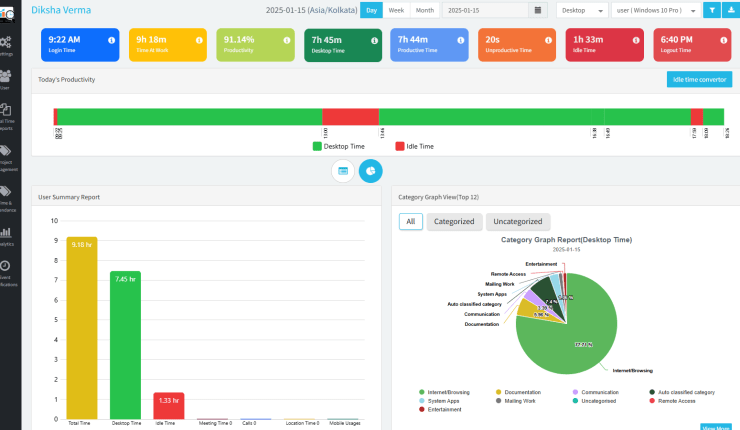These days, supporting employees in the workplace matters the most. The more human-like your employees feel at your organization, the better work they do. A thing to note is that one of the most professional relationships is between you and your direct employees. So the quality of support you provide them with can either make it or break it.
Supporting workplace employees is as important as everything else in your organization. In fact, as per a major long-term survey, businesses that have supporting workplace cultures grew 682% in revenue. So, now you know, what kind of company culture you need to have in your organization. However, how will you achieve that?
In this blog, we will tell you all about supporting employees in the workplace. By the end of this blog, you will have strategies that will foster a warm and welcoming culture in your organization. With that being said, let’s get right into it.
What is Support in the Workplace?
Support in the workplace is achieved by 3 things. Mutual respect, collaboration, and the willingness to help others. Thus, supportive organization environments are those where:
- Employees feel valued.
- Teams feel empowered.
- Employees perform work to the best of their abilities and skills.
Additionally, if organizations are supporting their employees, it works like a shield. It is due to employees receiving help going through tough times.
Read Also: Workload Management: The Complete Guide
12 Strategies for Supporting Employees in the Workplace

So far, you know a few benefits of supporting workers in the organization. However, to achieve it to the maximum levels, you need to implement some strategies. As per our experience, we have shortlisted 12 of the best ones for you.
1. Positive Work Culturing
To support your employees in the workplace to the best of their benefits, you need to have a positive work culture first. A positive work environment is one in which:
- Your employees feel a sense of belonging.
- Your staff feels trusted and safe.
- There is no employee favoritism or bias.
2. Listen
The key to implementing support in the workplace is to be a good listener. However, what happens instead is the opposite of it. Usually, managers are good speakers but not great listeners. Don’t believe us? Look at the stats below.
- According to a survey, around 50% of HR leaders said that their organizations promote improving their employees’ well-being.
- However, when employees were asked, experts found that only 30% of those claims were true.
It’s important to listen to your employees’ pain points. As absurd as it may sound, you need to be a part of their lives. It’s one of the key factors to promote supporting employees in your workplace.
- For example, you may think that an employee is purposefully not finishing work on time. However, upon asking, you may find out that they are having financial troubles and need a bonus or an advance paycheck.
- In fact, listening to your employees solves around 90% of all their problems without even planning a strategy.
3. Inspire
By motivating and inspiring your supporting staff, we mean that you need to be a role model and inspire them to excel by example. In fact, as per our experience, we have learned that employees put in the extra effort when you show them that the grass is never greener on the other side of the fence.
4. Communicate
Good communication is an important part of supporting employees in the workplace. Contrary to the first strategy we discussed, communication involves speaking, listening, and understanding. To achieve that in today’s technology-oriented work world, you need:
- Good communication channels
- Excellent networking systems
- A strong internet connection (obviously)
5. Give Feedback
Good feedback is essential to provide support for employees. It drives them forward with better progress, leading them to more opportunities for growth. However, you need to remember that:
- The feedback shouldn’t be rude. For example, if it contains criticism, it should be constructive.
- The feedback must be 360-degree oriented and unbiased.
- It must highlight the strengths and weaknesses of your employees.
6. Make Yourself Available
A big part of supporting employees in the workplace is that you should be available to them. However, that doesn’t mean that you should leave all your work and run to help an employee in need. What you can do here is:
- Allot a fixed time for your employees to explain their grievances. It only takes a few minutes.
- Assure your employees that you are always there for their help. Even if this is almost impossible, these mere words ensure that your employees always work with a healthy mindset.
7. Develop Employees
Continuously developing the skillset of your workplace employees supports their success. It helps them adapt to and become the best fit for the latest and ever-changing industry standards and requirements. Here are a few strategies regarding your employee training program:
- It should be curated for each employee’s specific needs.
- It should be flexible enough to fit into your employees’ schedules.
- The employee training plan must neither be too long nor too short.
- Data from your time tracking and employee monitoring software can also help make the best training program.
- Other than that, your skill development plan must:
- Increase job-oriented skills.
- Include education and training opportunities.
- Improve teamwork and punctuality.
- Develop truthfulness, respect, and communication skills.
- Develop strengths.
- Plan employees for their future roles.
- Help others cope with mental health problems.
- Encourage hard work and self-care.
8. Recognize Strengths
Supporting your employees in the workplace also involves recognizing their strengths and elevating them. Plus, it is also necessary to identify their weaknesses and eliminate them. Doing so leads them on a path of:
- Growth
- Development
- Opportunities
9. Employee Well-Being Matters
Supporting workers’ well-being in the organization is also a crucial element to success these days. We are living in the modern employee-centric era where every employee has specific personal needs. Remember that:
- Your employees are not robots and must never work like one.
- They have a life outside your office. So, it’s essential to:
- Give room to their personal space.
- Never hinder their privacy.
10. Compensate and Benefit Employees
One of the best ways for supporting employees in the workplace is to compensate them well for their hard work. Plus, it is also essential to provide benefits to your employees to keep them for long in your organization. These staff advantages include:
- Medical and other insurance.
- Bonuses.
- Ample time off and breaks.
- Advance paychecks.
- Holiday and festival gifts.
- Corporate celebrations.
- Occasional tours to rejuvenate and refresh.
11. Improve Employee Experience
Workplace employee experience involves how your employees feel in your organization. Are they satisfied? Is everyone able to work to the best of their skills and abilities? How’s the bonding culture between colleagues and superiors? We don’t mean that your employees should feel at home in your organization. However, they should at least be comfortable enough to work. To achieve this, you should:
- Eliminate micromanagement.
- Provide breaks and time off.
- Respect the personal and private space of your employees.
12. Flexible Work Arrangements
These days, it’s essential to promote and encourage employee work-life balance. As we mentioned before, your employees have a life outside their workplace. Thus it’s essential to follow these strategies for supporting your employees.
- Provide flexible work schedules that allow your employees to attend to emergencies.
- Incorporate a hybrid working model, which allows employees with special needs to work from home.
7 Benefits of Supporting Employees in the Workplace

Now for the icing on the cake. Supporting your employees in the workplace provides you with many benefits. We already saw one about colleagues and supervisors helping each other. However, that doesn’t just stop there.
1. More Productivity
If employees are supported well, they always work to the best of their skills. Plus, they actively listen and always try to push efforts beyond their limits, which significantly boosts their productivity. In short, a supported and encouraged workforce:
- Always works as per your goal settings.
- Always puts in the best effort to reach the collective business target.
- Stays longer in your organization.
2. Improved Engagement
One of the benefits that come from supporting your employees is improved engagement. Employee improved engagement is how much your employees are dedicated to and enthusiastic to help you reach your objectives. Overall, the more support an employee gets, the more engaged they are in their work.
3. Increases Motivation
When your workplace employees know that they are well-supported, they get more motivation to push forward and add in the extra effort. Their mentality is rewired to thinking that “I can do this, if my manager can”, or “No matter if it’s tough, my manager has got my back.” A culture like this ensures more and more success for your organization.
4. More Satisfied Employees
Supporting employees in the workplace results in more satisfaction. When you put your employees’ preferences into consideration, they feel a sense of belonging. Overall, it benefits your organization in many ways including:
- More and more new talents joining your business.
- Employees work overtime at will because they feel comfortable working for you.
5. Employees Stay Longer
Optimal support in the workplace ensures that your employees stay longer in your organization. It means that it becomes easier to retain your best teams, leading to more growth. Plus, it also saves expenses as the need frequency to hire new talents decreases.
6. Minimized Burnout
Employee burnout for any reason is bad for their mental health and can lead to low productivity. However, when you start understanding your employees in a better way and promoting work-life balance, you can reduce or in certain cases eliminate burnout.
How to Support Employees with DeskTrack?
Time tracking and employee monitoring software DeskTrack is the best software solution in the industry for employee management. Not only does it help you take charge of your teams’ workflows but also understand pain points and provides support by:
- Identifying idle times of your employees. If an employee is too idle, it will give you a hint to look into their grievance.
- Monitoring employee activities with screenshots to provide better support to your employees.
- Behavior analytics to help understand unusual work patterns.
- URL, file, and app usage monitoring to understand whether an employee is going off track.
- Call logging to identify unproductive calls and much more.
Conclusion
We hope you have now wrapped your heads around supporting employees in the workplace and why it is the most essential. These days, better understanding your employees on a closer level is as important as everything else for your business. Doing so brings more employees, helps you retain talent, and attracts more success and growth. However, it is also important to understand your employees from all aspects of their lives to provide the best support system. It is achieved by mutual respect, collaboration, and the willingness to help each other to create the most preferred Work Schedule. Moreover, it is not as simple as it sounds as every employee is as unique as your diverse work culture. You need to implement some expert strategies right away for the most benefits. Overall, businesses that support their team members gain more productivity, and more employee satisfaction, and can easily hire new talent.
Frequently Asked Questions (FAQ)
Q. What Does Supporting Employees in the Workplace Mean?
Ans. To support employees in the workplace means helping them get through tough times and motivating their work-life balance through understanding. It is achieved by mutual respect, collaboration, and the willingness to help each other to create the most preferred work culture.
Q. How Can You Support Your Colleagues in the Workplace?
Ans. Not only managers but colleagues can also support each other. Here are some instances of the same.
- Colleagues volunteering to help with projects.
- Offering a hand at technical aspects.
- Brainstorming with colleagues to find a quick solution to a problem.
- Mentoring your colleague if you are more experienced.
Q. What are Some Strategies for Supporting Your Employees in the Workplace?
Ans. These strategies for supporting employees in the workplace actually work.
- Positive Work Culturing
- Listen
- Inspire
- Communicate
- Give Feedback
- Make Yourself Available
- Develop Employees
- Recognize Strengths
- Employee Well-Being Matters
- Compensate and Benefit Employees
- Improve Employee Experience
- Flexible Work Arrangements
- Reward Employees
Q. What are the Benefits of Supporting Employees in the Workplace?
Ans. Here are some reasons why supporting employees in the workplace is important.
- More Productivity
- Improved Engagement
- Increases Motivation
- More Satisfied Employees
- Employees Stay Longer
- Minimized Burnout
- Simpler Recruiting
















